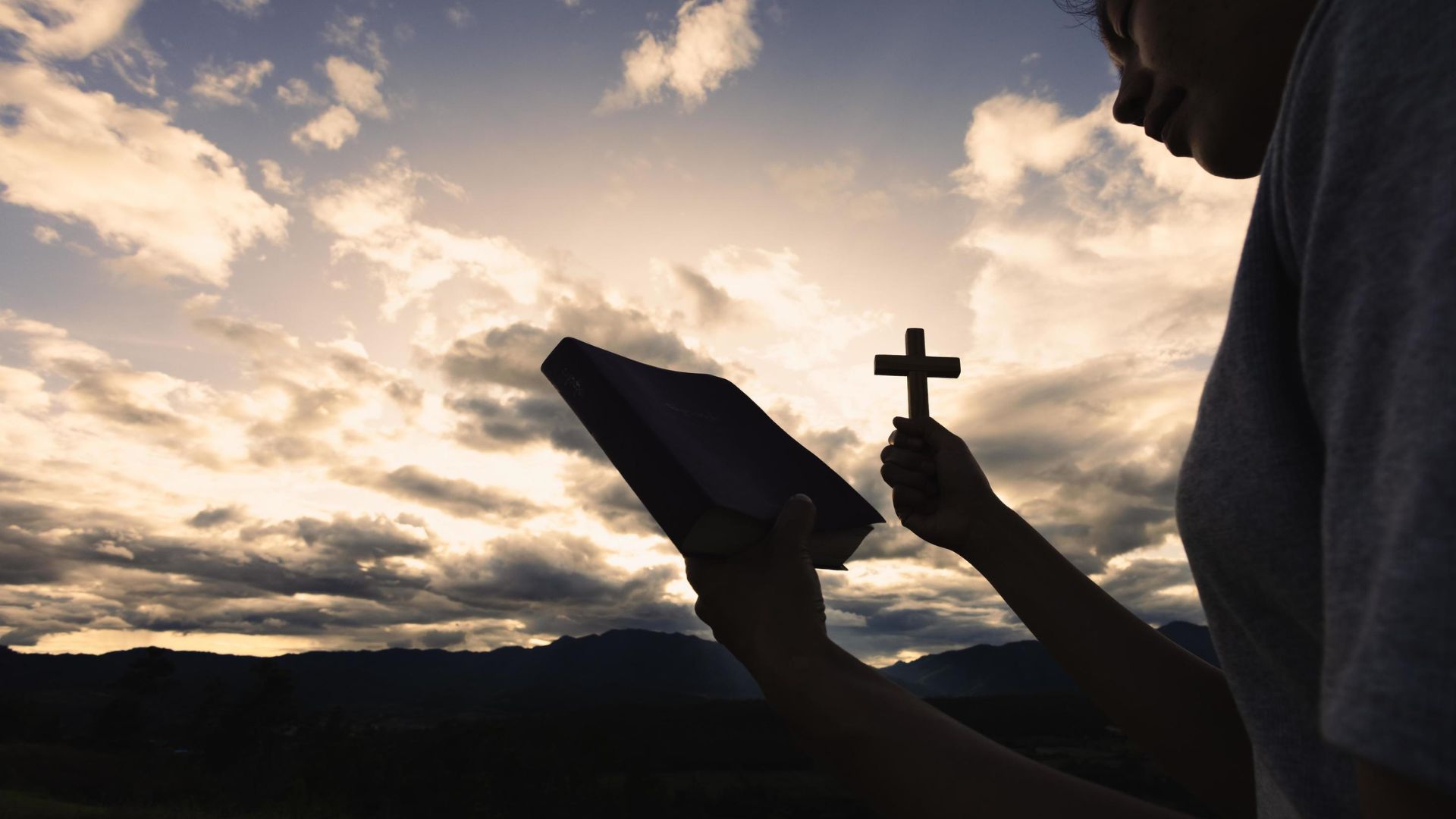What Does Unspoken Prayers Mean In Spirituality?
Curious about 'what does unspoken prayers mean'? Explore the spiritual significance of unspoken prayers and their personal connection.
Author:Suleman ShahReviewer:Han JuSep 29, 20231.3K Shares116.5K Views

The unspoken prayerstypically refer to thoughts, wishes, or desires that someone holds in their heart or mind but do not express verbally in the form of a traditional prayer. These unspoken prayers are often deeply personal and may relate to a person's hopes, concerns, or needs.
While they may not be spoken aloud, some individuals believe that these unspoken prayers are still heard or understood by a higher power or the universe. The interpretation and significance of unspoken prayers can vary depending on individual beliefs and cultural contexts. So here we will discuss what does unspoken prayers meanand it's significance.
What Does Unspoken Prayers Mean?
"Unspoken prayers" refers to the thoughts, wishes, or desires that people hold in their hearts or minds but do not vocalize or express through spoken words or formal prayers. These unspoken prayers can be deeply personal and may pertain to a wide range of hopes, concerns, or needs, such as personal struggles, aspirations, or requests for help and guidance. People often keep these thoughts private, either because they are too personal or because they choose not to share them with others.
The concept of unspoken prayers can vary depending on one's religious or spiritual beliefs. In some traditions, it is believed that God or a higher power can understand and respond to these unspoken prayers, even if they are not explicitly voiced. Others may view unspoken prayers as a form of silent communication with the divine or as a way to connect with their inner selves.
In a more general sense, "unspoken prayers" can also refer to unexpressed wishes or hopes in secular contexts, not necessarily related to religious or spiritual matters. These are the things people hold in their hearts and minds but choose not to articulate verbally to others.
Don’t Be Afraid To Pray
As a result of fear, remorse, or even shame, many people keep their unsaid desires to themselves. But the family and presence of God are a place of love, truth, and peace, not of condemnation or judgment.
The first is that your sorrow and sadness can be understood by the Holy Spirit of God. He knows you better than you know yourself. He can convey your heart to God and God's heart to you, regardless of how many or how few words you use.
Therefore, do not hold back when you have the chance to communicate your silent prayer request; although it may occur, keep in mind that God always responds to the prayers of His people.
The Notion Of Prayers That Are Not Verbally Expressed
In spirituality, prayers are frequently connected to spoken or written expressions, poem recitations, or structured rituals. Unspoken prayers, on the other hand, go beyond the limitations of language and adopt a more intuitive and intimate form of communication.
They are expressed through the language of the heart, the unspoken world of emotions, and the unsaid thoughts that are known only to the person and the divine and come from a deep desire of the soul. Unspoken prayers can take many different forms, including silent meditations, wordless observations, or even brief periods of peace and silence.
Significance Of The Unspoken Aspect Of Prayer
Prayer's unspoken element is extremely important for the spiritual journey. Bypassing the constraints of language and human articulation, it enables a profound connection between the person and the divine. The silent realm is where one's ideas, feelings, and intentions are fully exposed to the divine presence.
Unspoken prayers foster vulnerability by allowing people to communicate their deepest aspirations, anxieties, and thanks without using words. They make it possible to have a direct and personal dialogue with God, establishing intimacy and understanding that go beyond words.
Unspoken Prayers As Silent Communication With The Divine
The silent language of ideas and emotions gives voice to unspoken requests. By conveying our deepest desires, hopes, and aspirations to the almighty through the strength of thought and the depth of emotion, we engage in a profound inner dialogue when we offer our silent prayers.
Unspoken prayers are built on our thoughts, which carry the weight of our aspirations, concerns, and questions. We converse silently with the divine in the world of the mind, expressing our desires, anxieties, and hopes without saying a word.
God Understands Unspoken Prayers
Unspoken prayers are deeply rooted in the strong belief that the divine perceives them with absolute clarity and compassion. The divine presence, which is frequently portrayed as all-knowing and all-seeing, can hear the silent petitions that come from the very core of ourselves.
Even when our petitions are not verbally communicated, the divine presence is said to understand the subtleties and intricacies of such requests. The divine can interpret the silent language of our souls by detecting even the slightest changes in our thoughts, feelings, and intentions. Knowing that a kind and caring higher power receives and accepts our silent prayers gives comfort and assurance.
Unspoken Prayers Transcend Language Barriers
Unspoken prayers have a remarkable capacity to transcend the boundaries of language, making them available to people from all linguistic and cultural backgrounds. While spoken prayers may be constrained by particular languages or traditions, unspoken prayers transcend linguistic boundaries and provide a unifying channel for communicating with the almighty.
The language of the heart and soul takes precedence over spoken language in silent prayers. It is a language that transcends linguistic distinctions, philosophical perspectives, and cultural norms.
Deep Connection And Vulnerability In Unspoken Prayers
Unspoken prayers have a wonderful ability to establish a strong bond between people and the supernatural. A spiritual tie develops in the domain of the unspoken that goes beyond the surface and into the depths of the soul. Unspoken prayers flourish in this atmosphere of openness as people expose their deepest desires, anxieties, and hopes to the holy presence.
Personal And Intimate Nature Of Unspoken Prayers
Unspoken prayers have a private and intimate element that is particular to each person. They provide a sacred environment where people can deeply express their innermost feelings, thoughts, and desires.
Unspoken prayers continue to be a private conversation between the person and the divine, in contrast to spoken prayers that others may share or hear. Unspoken prayers are intimate because they can reach the core of one's being.
They enable people to discover who they truly are, to connect with their deepest goals, and to look to the divine for comfort, direction, or gratitude. Unspoken prayers encourage self-expression, self-reflection, and self-discovery in people, building a close relationship with the divine.
Unspoken Prayers Can Reveal The True Desires Of The Heart.
Unspoken prayers can reveal the actual desires of the heart. People can access their true desires and intentions when they express their prayers in silence, free from the limitations of verbal speech. People can dive into the depths of their souls and discover their true hopes, dreams, and yearnings amid the silence of unsaid prayers.
Unspoken prayers provide people the freedom to express their actual desires, even those they may be unwilling to say aloud because they are free from outside influences or societal expectations. Unspoken prayers offer clarity and alignment between the person and the divine by disclosing the heart's actual wishes.
Unspoken Prayers As A Form Of Surrender And Trust
Unspoken Prayers Symbolize Surrendering To A Higher Power
Unspoken prayers are a powerful metaphor for submitting to a higher power. We admit that there are areas of our lives that are beyond our control by articulating our deepest aspirations, worries, and ambitions in the silent domain. Unspoken prayers are a way of letting go, relinquishing control, and entrusting our needs to a greater intelligence.
Trust Involved In Unspoken Prayers, Relying On The God’s Understanding
Unspoken prayers demand a high degree of faith in the almighty. We have faith that the divine presence hears our silent requests and fully understands them on a level above our finite human knowledge.
Knowing that the divine understands the wider picture and will act in the best interests of our spiritual development and well-being enables us to let go of our worries, doubts, and fears.
The Act Of Releasing Control And Allowing God To Work In Mysterious Ways
Unspoken prayers entail letting go of our need for power and acknowledging that the supernatural operates in mysterious ways. They accept that sometimes the paths and results may not match our immediate expectations or wants. By letting go of our desire for precise results, we allow the divine to lead us and have faith that the better plan will manifest in ways that are beyond our grasp.
Unspoken Prayers And The Power Of Intuition
The Role Of Intuition In Unspoken Prayers
Unspoken prayers often rely heavily on intuition. Our inner wisdom and heavenly guidance are accessible to us through our quiet voice. Unspoken prayers frequently coincide with our intuitive sensibilities, acting as a channel for getting guidance from the divine. Our unspoken prayers are sincere and in line with our deepest beliefs and ambitions when they are expressed through intuition.
Unspoken Prayers Align With Inner Knowledge And Divine Guidance
Unspoken prayers can be in perfect harmony with our inner wisdom and spiritual guidance. Unspoken prayers become a channel for obtaining insight, direction, and spiritual connection when we permit ourselves to pay attention to our intuition. They turn into a mechanism for us to communicate with the wisdom and direction of the divine, enabling our silent prayers to materialize in ways that advance our highest welfare.
Transformative Potential Of Trusting And Following Intuitive Nudges
Unspoken prayers that trust and heed our intuition nudges can result in life-changing encounters. Synchronicities, chance encounters, and possibilities enter our lives when we respect and follow our intuition's direction. We can traverse our spiritual journey with better clarity and alignment by trusting the divine's direction and paying attention to our intuitive cues. This ultimately results in personal transformation, growth, and a closer relationship with the divine.
The Healing And Comfort Of Unspoken Prayers
Unspoken Prayers Provide Solace And Healing
Unspoken prayers have a significant healing impact on people. They provide consolation and solace in times of suffering, grief, or loss when word expression is inadequate.
Unspoken prayers provide people the chance to express their feelings while seeking comfort from the supernatural. They develop into a catalyst for personal growth, providing a haven for emotional expression, inner serenity, and the knowledge that one is not struggling alone.
The Power Of Unspoken Prayers In Times Of Grief, Pain, Or Loss
Unspoken prayers turn into a haven where people might find comfort during times of sorrow, suffering, or bereavement. They create a safe environment where people can fully express their feelings, acting as a conduit for catharsis and healing. Unspoken prayers provide comfort during difficult times by reminding people
The Comfort And Reassurance Of Unspoken Prayers
Unspoken prayers provide consolation and confidence that go beyond the bounds of speech. Unspoken prayers can be a source of comfort while facing uncertainty or anxietybecause they establish a connection with the heavenly presence that eases the heart and calms the soul. They serve as a reminder that despite difficulties, we are loved and supported by a greater force that is aware of our true needs.
Unspoken Prayers And The Shared Connection Of Believers
Power Of Unspoken Prayers Within A Community
When prayed together as a community of believers, unspoken prayers have a powerful collective effect. When people join in silent prayer, a deep spiritual connection is created. These silent prayers are amplified by the collective energy they generate, which spreads supportive thoughts and actions across the neighborhood.
Unspoken Prayers Unite And Support Believers
By encouraging a feeling of shared experience and empathy, silent prayers can bring Christians together and support them. Unspoken prayers help Christians understand that their challenges, goals, and desires are not unique but rather a part of the larger human experience. A place for Christians to empathize with one another and offer support, understanding, and solidarity in their spiritual journeys is created through the shared stillness of unsaid prayers.
The Sense Of Interconnectedness And Empathy In Unspoken Prayers
Unspoken prayers foster a strong sense of community among Christians that transcends time, space, and linguistic boundaries. Knowing they are part of a broader tapestry of human existence, believers interact on a spiritual level in the world of silent prayers. As people come to understand the universalism of human suffering and the strength of group solidarity, this shared experience fosters empathy and compassion.
Reasons For A Prayer Unspoken
There are several reasons why someone can choose not to say a prayer.
- Lack of belief in the effectiveness of prayer or doubt about it could be one factor.
- Another factor can be a sense of guilt or unworthiness, leading one to believe that their crimes are too great for God to hear them when they pray.
- Additionally, someone may experience discouragement or a sense of hopelessness, believing that their prayers would not change the course of events.
- It is crucial to keep in mind that God is always willing to hear and answer our prayers, despite our skepticism or feelings of inadequateness.
How To Unspoken Prayer Request For A Friend?
Have you ever felt useless because you didn't know how to pray for a friend who was in need? It's not just you. When someone we care about is struggling, we frequently are at a loss for words. Even if you don't know what to say, follow this advice on how to pray for a friend who is in need.
- First, keep in mind that God is aware of your friend's needs even when you are not. Therefore, don't think you need to know all the answers. Just share your knowledge with God and ask Him to aid your friend in their time of need.
- Second, make an effort to visualize yourself in your friend's position and their sentiments. You can pray more precisely for their situation as a result of this.
- Last but not least, remember to pray for yourself as well. It might be difficult to witness a friend go through suffering, so keep in mind to pray to God for courage and insight while you help your buddy get through their current circumstance.
How To Unspoken Prayer Request For Family?
You undoubtedly have a list of things you frequently pray for, just like the majority of people. But what about your family's silent prayer requests? What matters do you find awkward to discuss with others but yet need prayer for? Here are some suggestions about how to pray for your family's unstated needs:
- Begin by praying to God for wisdom. You could have some things you don't want to talk about with anyone, but you can talk to God about them. He is already aware of what is going on in your life and can advise you on what to do.
- Next, ask God for direction. Ask Him to guide you, your family, and your household on the correct path. He can guide you in making the greatest choices because he is aware of what is best for you.
- Lastly, ask God for strength. These unspoken prayer requests can be difficult, but God may provide a way for further help.
FAQs
Does God Answer Unspoken Prayers?
Before he spoke, he was already aware of the subject of the servant's prayer. Before the servant had opened his eyes, God answered his prayers. Please spread this reflection because it will inspire others.
What Are The Benefits Of Silent Prayer?
Contemplative prayer, which is performed in silence, helps us to rest in the totality of God and his love. We are drawn away from striving, fear, and protecting borders by this tranquil exercise.
How Do You Know If God Hears Your Prayers?
The Bible teaches that if we pray to God with faith and sincere intent, He will always hear us and grant our requests. We shall experience reassurance that He hears us in our hearts, along with a sense of calm and tranquility.
Conclusion
Unspoken prayers encompass the deeply personal and often unexpressed thoughts, wishes, and desires that individuals hold within themselves. These unspoken prayers go beyond the boundaries of traditional verbal prayers, representing an intimate form of communication with a higher power or the divine. Hope now it's clear what does unspoken prayers mean and how important unspoken prayers are.
They are a silent language of the heart, emotions, and thoughts, allowing individuals to connect with the spiritual realm profoundly. Unspoken prayers foster vulnerability by allowing individuals to express their innermost feelings, hopes, and concerns without words, establishing a deep and personal connection with the divine.
Jump to
What Does Unspoken Prayers Mean?
Significance Of The Unspoken Aspect Of Prayer
Unspoken Prayers As A Form Of Surrender And Trust
Unspoken Prayers And The Power Of Intuition
The Healing And Comfort Of Unspoken Prayers
Unspoken Prayers And The Shared Connection Of Believers
Reasons For A Prayer Unspoken
How To Unspoken Prayer Request For A Friend?
How To Unspoken Prayer Request For Family?
FAQs
Conclusion

Suleman Shah
Author
Suleman Shah is a researcher and freelance writer. As a researcher, he has worked with MNS University of Agriculture, Multan (Pakistan) and Texas A & M University (USA). He regularly writes science articles and blogs for science news website immersse.com and open access publishers OA Publishing London and Scientific Times. He loves to keep himself updated on scientific developments and convert these developments into everyday language to update the readers about the developments in the scientific era. His primary research focus is Plant sciences, and he contributed to this field by publishing his research in scientific journals and presenting his work at many Conferences.
Shah graduated from the University of Agriculture Faisalabad (Pakistan) and started his professional carrier with Jaffer Agro Services and later with the Agriculture Department of the Government of Pakistan. His research interest compelled and attracted him to proceed with his carrier in Plant sciences research. So, he started his Ph.D. in Soil Science at MNS University of Agriculture Multan (Pakistan). Later, he started working as a visiting scholar with Texas A&M University (USA).
Shah’s experience with big Open Excess publishers like Springers, Frontiers, MDPI, etc., testified to his belief in Open Access as a barrier-removing mechanism between researchers and the readers of their research. Shah believes that Open Access is revolutionizing the publication process and benefitting research in all fields.

Han Ju
Reviewer
Hello! I'm Han Ju, the heart behind World Wide Journals. My life is a unique tapestry woven from the threads of news, spirituality, and science, enriched by melodies from my guitar. Raised amidst tales of the ancient and the arcane, I developed a keen eye for the stories that truly matter. Through my work, I seek to bridge the seen with the unseen, marrying the rigor of science with the depth of spirituality.
Each article at World Wide Journals is a piece of this ongoing quest, blending analysis with personal reflection. Whether exploring quantum frontiers or strumming chords under the stars, my aim is to inspire and provoke thought, inviting you into a world where every discovery is a note in the grand symphony of existence.
Welcome aboard this journey of insight and exploration, where curiosity leads and music guides.
Latest Articles
Popular Articles



